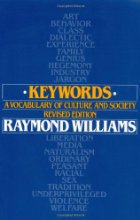Lissa Paul talks about our new book, Keywords for Children’s Literature, forthcoming from NYU Press in the Spring of 2011. Â I say “our” new book, but we are merely the editors. Â We did each contribute an essay of our own (Lissa wrote on “Literacy,” I wrote on “Postmodernism”), but other experts wrote the other 47 essays: Philip Pullman on “Intention,” Peter Hunt on “Children’s Literature,” Marah Gubar on “Innocence,” Beverly Lyon Clark on “Audience,” David Booth on “Censorship,” Mavis Reimer on “Home,” and many others. Â Â Lissa gave the talk last week, at the University of British Columbia. Â The talk runs 35 minutes, and questions take up the remaining 25 minutes.
What is a keyword?  As Lissa notes in her talk and as we say in our introduction, a keyword is both crucial and contested.  These are important words that we use, but on whose meanings we do not agree.  So, Keywords for Children’s Literature follows in the spirit  of Raymond Williams’s influential Keywords (1976), in offering “an exploration of the vocabulary of a crucial area of social and cultural discussion.”  The main difference is, of course, that we’re focusing on words important to the study of children’s literature – and, in this sense (of tracking words within a particular field), Bruce Burgett and Glenn Hendler‘s Keywords for American Cultural Studies provided a model for us.  Williams wrote all of his own keywords, but we and they sought experts – one per word, or sometimes a pair collaborating on a word.
of Raymond Williams’s influential Keywords (1976), in offering “an exploration of the vocabulary of a crucial area of social and cultural discussion.” Â The main difference is, of course, that we’re focusing on words important to the study of children’s literature – and, in this sense (of tracking words within a particular field), Bruce Burgett and Glenn Hendler‘s Keywords for American Cultural Studies provided a model for us. Â Williams wrote all of his own keywords, but we and they sought experts – one per word, or sometimes a pair collaborating on a word.
Mapping meanings of key terms, the book is not intended as the last word on the subject, but rather as an invitation to begin a conversation. Â We hope that the essays inspire further discussion, debate, and suggestions. Â Which words do readers find generative for their own scholarship? Â Which words have we omitted? Â In about six months, we’ll look forward to seeing where that conversation goes! Â (And, yes, I’ll post again on the subject – including a complete list of keywords – closer to the pub date.)
